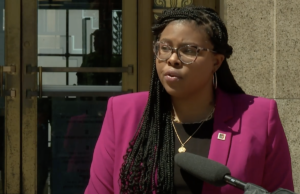
Nashville is investing in a program that aims to prevent people with mental illness or cognitive delays from cycling through the criminal justice system.
The mayor’s office announced that it plans to put $600,000 in next year’s budget toward the city’s Mental Health Court, which allows a few dozen people each year who are arrested for crimes to receive treatment and support services instead of going to jail. The money will be used to expand the special court program, which has been around for more than a decade.
The main purpose of the funding is to resolve what the city is calling a “crisis in competence to stand trial.” When someone is arrested for a crime, their case can only move forward if a judge decides they are mentally fit. If someone has a severe mental illness or intellectual disability and cannot understand what’s going on, they are supposed to get treatment instead.
Before that can happen, a specialist needs to evaluate them. But there is currently a backlog, which leaves people waiting an average of 60 days — and sometimes as long as 90 — for an evaluation, according to a new report from the mayor’s Task Force on Competency & Wellbeing.
The $600,000 will help to pay for those assessments. Judge Melissa Blackburn, who runs the Mental Health Court, says they will also fund more support services for people who get arrested and need mental healthcare.
 Screenshot Courtesy Metro Nashville YouTube
Screenshot Courtesy Metro Nashville YouTubeJudge Melissa Blackburn runs special court programs for veterans people with mental illness who are arrested.
“These individuals will not be cycling through the jail, we hope,” she said at a press conference last week.
Blackburn said the money will help to place people in transitional housing with support staff. It will also pay for two new positions, including a client specialist, which she described as: “a manager that will take care of where they are, know where they are, know if they’re taking their medication, are they going to their appointments and one-on-one knowledge of each of these individuals as they come through this court.”
People with mental illness are overrepresented in the court system, and they often find themselves in a revolving door.
The city’s task force report looked at the records of people who were arrested for a misdemeanor last fall but were not considered fit for trial. About two thirds of them were arrested again within 90 days. They were arrested at nearly twice the rate of folks who were deemed competent for trial, the report found. Nearly a third were experiencing homelessness.
 Screenshot Courtesy Metro Nashville YouTube
Screenshot Courtesy Metro Nashville YouTubePublic Defender Martesha Johnson urges the city to invest more resources in mental healthcare at a press conference on April 14, 2022.
The goal of the funding is to get those people the help they need, before they end up back in court with another charge.
This city funding follows several other recent steps to divert people with mental illness out of the criminal justice system. Last year, Nashville launched Partners in Care, which pairs police with mental health clinicians to respond to some 911 calls. In 2020, the sheriff’s office opened the Behavioral Care Center, a facility next-door to the downtown detention center that provides operates like a hospital instead of jail and treats people with severe mental health conditions instead of punishing them.
Still, these resources are only available after police have gotten involved — and often after someone has been arrested. Public Defender Martesha Johnson says she wants the city spend more on preventative care, before anyone ends up in court.
“That requires an extremely deeper dive than what we have the resources for today,” she said at the news conference. “I think the investment itself allows us the opportunity to, one, recognize that the way we’ve done it in the past hasn’t been successful.”

